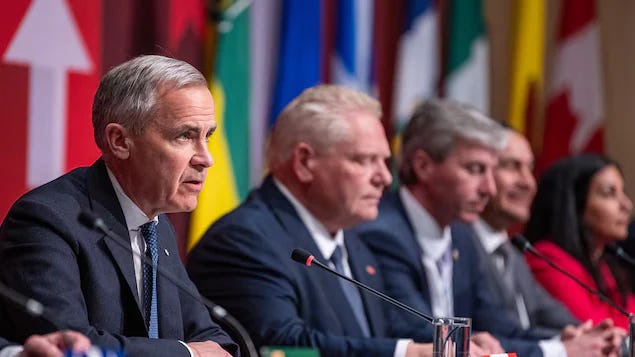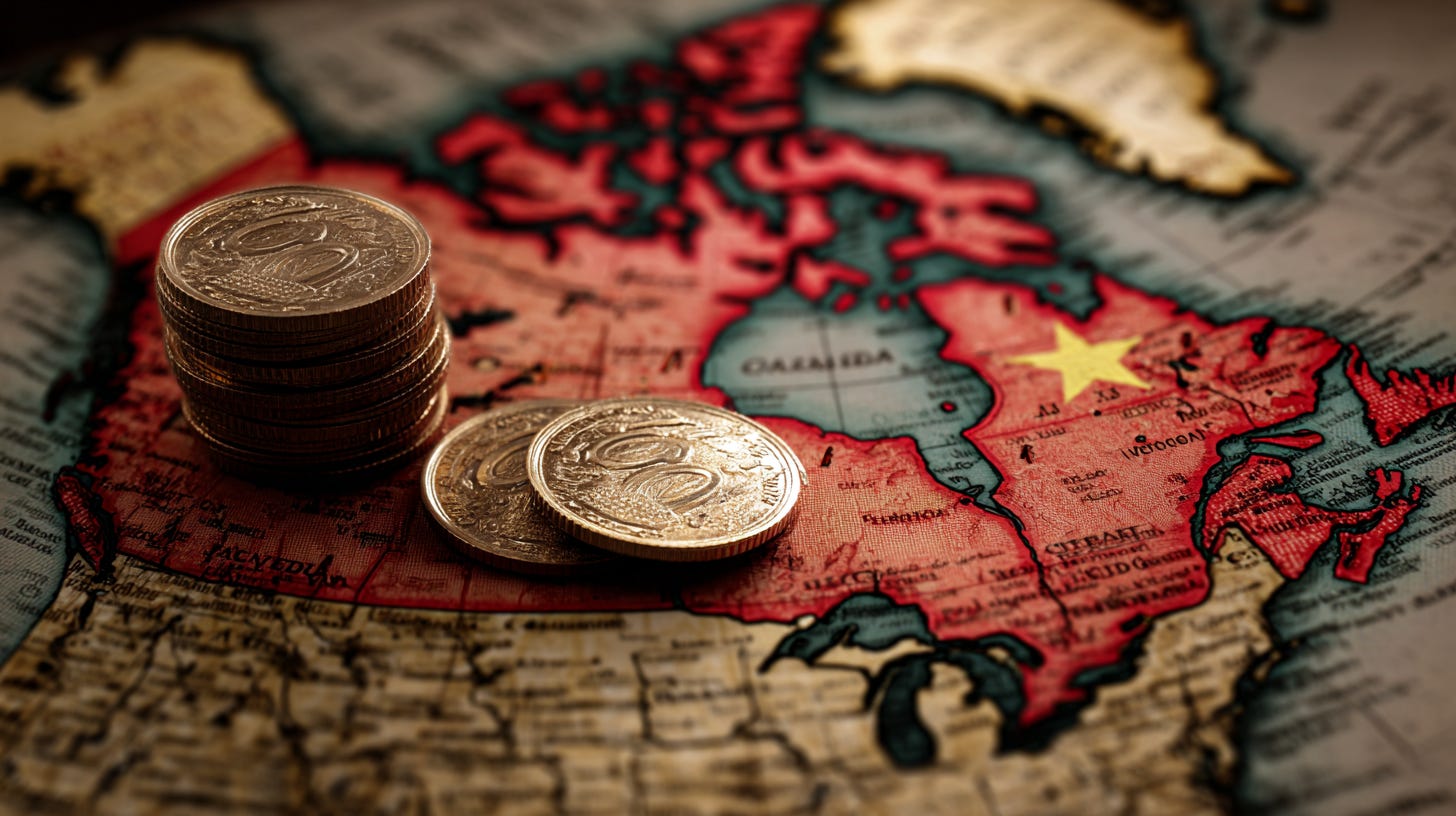Good morning, It’s Thursday, July 3rd. In today’s news, Canada’s government is abandoning the vaccine-injured despite its promises, provincial barriers are stalling internal trade even after Carney cleared the way federally, the Chinese Communist Party is quietly buying up Canada one town at a time, the European Union rolls out sweeping new disinformation laws targeting Big Tech, and much more.
First time reading the daily blend? Sign up here.
Canada Coerced the Public Into Taking an Experimental Vaccine—Now It’s Abandoning the Injured
When the government urged Canadians to take an experimental vaccine “for the greater good,” it promised that anyone harmed would be taken care of. That promise is unraveling in real time.
In December 2020, then-prime minister Justin Trudeau announced the Vaccine Injury Support Program (VISP)—a no-fault compensation scheme meant to support those who suffered serious and permanent injuries from Health Canada-approved vaccines. But a five-month investigation by Global News reveals that the program has become a bureaucratic nightmare, leaving victims in limbo, drowning in debt, and questioning the very system that claimed to protect them.
Despite decades of calls for a vaccine injury program—something every other G7 country already had—Canada hastily cobbled one together during a crisis, and then outsourced it to Oxaro Inc. The result? Of the $50.6 million spent so far, a staggering $33.7 million has gone to administrative costs. Just $16.9 million has actually made it into the hands of the injured. In other words, for every dollar paid to a claimant, nearly two were spent on bureaucracy.
It gets worse. Oxaro and the Public Health Agency of Canada grossly underestimated the number of claims they’d receive—predicting just 40 valid cases per year, later bumped up to 400. In reality, over 3,000 Canadians have filed claims. Nearly 1,700 are still waiting for a decision. Many can’t even reach a case manager and are left to crowdfund online just to afford medicine and mobility devices.
Some have their claims rejected by doctors they’ve never spoken to—faceless panels making life-altering decisions without so much as a phone call.
Just ask Becky Marie Campbell. A healthy schoolteacher and mother of four, Becky was left unable to walk just three weeks after her COVID shot in April 2021. She was hospitalized, subjected to a psychiatric evaluation simply for asking if her condition might be linked to the vaccine, and later discharged in a wheelchair. Her own physician said the illness was “most likely related” to the shot. But VISP’s anonymous panel said otherwise—and denied her claim.
She never even got a call.
For many like Becky, the money isn’t the point. It’s the betrayal. Canadians were told this was safe, rare, and necessary. When it wasn’t, they were told they'd be supported. Instead, they were ignored, dismissed, and left behind. Source.
National Trade: Carney Removes All Federal Trade Barriers—Provincial Rules Still Holding Canada Back
Ottawa has officially eliminated all remaining federal trade exceptions under the Canadian Free Trade Agreement (CFTA), fulfilling Prime Minister Mark Carney’s commitment to create “one Canadian economy out of 13.” Internal Trade Minister Chrystia Freeland announced the removal of 53 federal trade barriers, primarily related to procurement rules in sectors like transportation, land development, and space.
While this marks a major federal milestone, significant trade barriers remain at the provincial level, which continue to restrict the free movement of goods, services, and labour across Canada. Supply management systems for dairy, poultry, and eggs—regulated provincially—are still intact and act as a major obstacle for small-scale and interprovincial producers.
Though provinces have pledged to review their exceptions and some, like Ontario and Manitoba, have made bilateral progress, the fragmented provincial rules continue to stifle trade. Experts warn that despite federal action, real change will take years, with regional supply chains slow to adapt and entrenched interests in some provinces resisting reform.
As Deloitte’s Dawn Desjardins puts it, the new One Canadian Economy Act “is not a magic wand”—federal progress won’t automatically dissolve the red tape and parochialism that still dominate provincial trade dynamics.
How the Chinese Communist Party Is Buying Up Canada—One Town at a Time
The Chinese Communist Party isn’t sending tanks to our borders. It’s buying up our towns.
Through the guise of economic investment, China is embedding itself into key Canadian industries—from aquaculture to aviation—while quietly advancing its geopolitical and military interests. The strategy is simple: target economically vulnerable towns, offer capital under the cover of business development, and use the infrastructure to expand state influence abroad.
One of the clearest examples of this playbook is Powell River, a sleepy coastal town in British Columbia.
On the surface, Powell River’s story looks like small-town revival. A Chinese-owned hatchery moved in to meet global seafood demand. Harbour Air expanded routes with help from a major Chinese investor. Private schools were proposed to serve international students. Even the local airport was pitched as the site of a new aviation park.
But pull back the curtain, and the pattern is concerning.
The hatchery is tied to a Chinese state-run research institute involved in marine genome mapping and expansion of aquatic control zones. Harbour Air sold a nearly 50% stake to Zongshen Group—a company that manufactures drone engines for China’s military. The town’s flight school trains Chinese pilots, some of whom are connected to state-owned airlines involved in transporting Uyghurs to forced labour camps. Even the town’s shuttered pulp mill was sold to companies aligned with the CCP’s Belt and Road Initiative.
So why does this matter?
Because these aren’t just business deals. They’re about control. When a foreign authoritarian regime owns your food systems, your aviation routes, your pilot schools, your ports, and your coastal land—they aren’t just “investors.” They’re positioning themselves for leverage. Over your economy. Over your infrastructure. Over your sovereignty.
This isn’t theoretical. Powell River sits directly across from military bases like CFB Comox and CFB Nanoose—critical locations for naval testing and surveillance. The CCP isn’t just here to fish and fly—it’s planting assets next to key Canadian defense points. In the event of a geopolitical standoff, these seemingly innocent investments could serve as logistical hubs, surveillance posts, or worse.
If Canada doesn’t wake up to how our economic openness is being used against us, we’ll lose control of our critical infrastructure—piece by piece. Not through invasion, but through contracts, leases, and boardroom deals.
And by the time we realize it, we won’t need to be conquered. We’ll already be owned.
Source: The Mosaic Effect, by Scott McGregor and Ina Mitchell (p. 196-222)
EU’s Big Tech Disinformation Law Comes Into Force
As of July 1, the European Union’s Digital Services Act (DSA) is now enforceable, making the once-voluntary Code of Practice on Disinformation mandatory for major tech platforms like Google, Meta, and TikTok. These platforms must actively combat disinformation, expand fact-checking, and cut financial incentives for false content, with fines of up to 20% of global revenue for violations.
Critics, including US officials and advocacy groups, warn that the DSA threatens free speech and amounts to state-backed online censorship. Tensions are rising as the US prepares retaliatory tariffs and denounces the EU’s approach, while some EU member states face legal action for failing to implement the law properly. More
CCP Leaders Push Back—Propose Regulations to Rein in Xi Jinping’s Superagencies
China’s Politburo is proposing new rules to rein in a powerful network of Party commissions created by Xi Jinping to centralize control. These commissions, which oversee key sectors like finance, tech, and foreign affairs, are now being criticized for overreach and inefficiency. The move is seen as a rare pushback against Xi's dominance, signalling internal power struggles and growing resistance among Party elites. With the recent purge of top military allies and Xi’s prolonged absences raising questions about his political strength, observers suggest his grip on power is weakening, and that it’s only a matter of time before the leader is replaced. More
North Korea to Send Another 30,000 Troops to bolster Russia’s Forces, Ukrainian Officials Say - More
Federal Judge Blocks Trump’s Order Barring People at US-Mexico Border From Claiming Asylum - US Judge Randolph Moss found that the Trump administration overstepped its authority and bypassed immigration law. More
Death Toll Hits 36 After India Pharmaceutical Factory Explosion and Fire - Another 36 workers remain in the hospital with burns and other injuries after the blast and fire at the Sigachi factory. More
The Dalai Lama Says He Plans to Reincarnate—Ensuring the Institution Will Continue - Tibetan Buddhists believe the Dalai Lama can choose the body into which he is reincarnated, as has happened on 14 occasions since the creation of the institution in 1587. More
Six People Accused of Witchcraft Were Killed in Burundi (A Country in East Africa)—Burned Alive and Stoned to Death: "Unspeakable barbarity" - More
Del Monte, the 139-Year-Old Produce Company, Seeks Bankruptcy Protection
Del Monte Foods, the iconic 139-year-old brand known for canned fruits and vegetables, has filed for bankruptcy protection amid declining demand for its core products. Shifting consumer preferences toward healthier and cheaper options, rising costs from inflation and steel tariffs, and increased competition from store brands have all contributed to the company’s financial struggles.
Despite growth in newer product lines like Joyba bubble tea and broths, it wasn’t enough to offset losses in its canned goods division. Del Monte, owned by Singapore’s Del Monte Pacific, has secured $912.5 million in financing to maintain operations during a court-supervised asset sale. More
Tesla Deliveries Down 13% As Decline Continues in Q2 2025 - More
Australian Airline Qantas Says Data From 6 Million Customers was Stolen by Cybercriminals - Qantas apologized and said it expects the proportion of data stolen 'will be significant.’ More
Microsoft Laying Off About 9,000 More Employees in Latest Round of Cuts - More
Patience Isn’t Just a Virtue—It’s a Life Saver
Patience isn’t just a virtue—it’s a biological advantage. Studies show that people who demonstrate greater patience have longer telomeres, the protective caps on DNA that are linked to slower cellular aging. Chronic impatience, on the other hand, contributes to elevated stress, inflammation, and lifestyle choices that accelerate aging and increase health risks like hypertension.
Research connects impatience with poor mental health, impulsive decisions, and strained relationships. Practicing patience—through tools like reframing delays, slow breathing, and daily "micro-wait" challenges—not only improves well-being but may help preserve youth at the cellular level. Ultimately, how we wait affects how we age. More
Scientists Just Found a ‘Sugar Switch’ That Protects Your Brain From Alzheimer's - It turns out neurons don’t just store sugar for fuel—they reroute it to power antioxidant defences, but only if an enzyme called GlyP is active. When this sugar-clearing system is blocked, toxic tau protein builds up and accelerates brain degeneration. More
Jury Finds Sean ‘Diddy’ Combs Guilty on 2 Counts in Sex Trafficking Trial, Not Guilty on 3
Sean “Diddy” Combs was found guilty on two counts of violating the federal Mann Act by transporting individuals across state lines for prostitution, but acquitted on three more serious charges: sex trafficking by force, fraud, or coercion, and racketeering conspiracy.
What This Means for Jail Time:
Each Mann Act conviction carries a maximum sentence of 5 years, so Combs faces up to 10 years in federal prison.
However, because he was acquitted of sex trafficking and racketeering, he avoided the 15-year mandatory minimum and potential life sentence he would have faced if convicted on those charges.
The judge has not yet set a sentencing date. Prosecutors are pushing for a “substantial period of incarceration,” while Combs’s lawyers argue for bail and leniency, citing this as his first conviction and the nonviolent nature of the charges.
Until sentencing, the judge is reviewing arguments about whether Combs should remain in custody or be released on bail. He remains in federal prison in New York. More
Rogers Communications Inc. Becomes the Majority Owner of MLSE - This includes the Toronto Maple Leafs, Raptors, Argonauts and Toronto FC, along with other properties. The acquisition expands Rogers' sports portfolio, which also includes the Toronto Blue Jays, Rogers Centre and Sportsnet. More
Ex-Blue Jay Kevin Pillar Announces Retirement After a 13-Season MLB Career - More
Paramount to Pay $16 Million in Settlement with Trump Over ’60 Minutes’ Interview - More
After an Unending Stream: A Medical Clinic in Scotland is Politely Begging Residents to Stop Flooding Them With "Inappropriate or Unsolicited" Urine Samples
Cult Leader Known as ‘Siberian Jesus’ Sentenced to 12 Years in Prison for Causing Physical and Psychological Harm to His Followers.
On This Day in 1863, The Battle of Gettysburg—the largest clash ever fought on North American soil—ends in a decisive Union victory, marking a major turning point in the US Civil War.



















Welcome to Chinada!